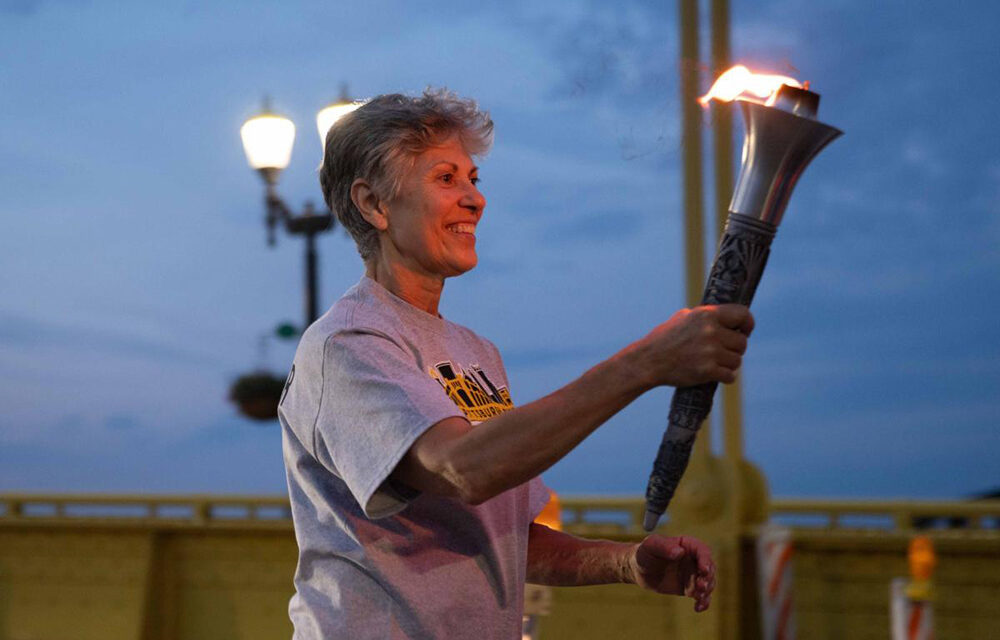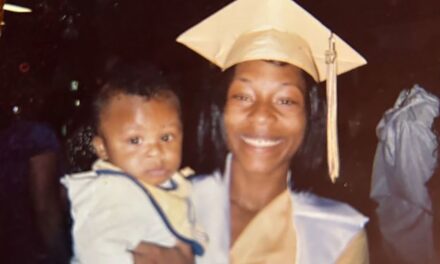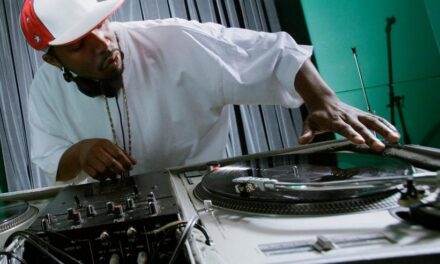
PAULA FRANETTI OF PITTSBURGH SERVES AS A TORCH RUNNER FRIDAY TO OFFICIALLY START THE NATIONAL SENIOR OLYMPIC GAMES, WHICH ARE BEING HELD AT THE DAVID L. LAWRENCE CONVENTION CENTER THROUGH JULY 18. | PHOTO BY KAYCEE YEARGIN/NATIONAL SENIOR GAMES
There was a point when Paula Franetti of Pittsburgh thought she would never walk again.
The National Senior Olympic Games competitor had been robbed of time on the basketball court when a speeding driver slammed into her white SUV.
With an incredible amount of determination, Franetti, now 67, has since returned to the court. She is competing in the senior games with her team, Steel City Quest, among more than 11,000 other athletes ages 50 and older at the David L. Lawrence Convention Center Downtown.
This is the first time Pittsburgh has hosted the games since 2005. The 2023 games will conclude on July 18.
This year’s games are extra special for Franetti — not only is she being recognized as a Humana Game Changer, but she also had the honor of being a torch runner to mark the beginning of the games on July 7.
Humana, presenting sponsor of the senior games, chooses 28 athletes out of 11,500 to be honored as game changers.
Humana representative Julie Mascari says it was a no-brainer to choose Franetti as one of their Game Changers.
“Despite a devastating auto accident in 2016, Paula’s spirit and determination propelled her to a remarkable recovery, allowing her to participate in the games with her former Penn State University teammates again,” Mascari says. “Paula was selected as a Humana Game Changer because she serves as an example of how staying active can contribute to long-term health and well-being and how finding an activity you love can make it easier to stay moving.”
The biennial National Senior Olympic Games are made up of more than 20 sports, such as basketball, archery, badminton, cornhole, swimming, soccer, cycling, bowling, shuffleboard and pickleball. The U.S. National Senior Sports Organization was formed in St. Louis, MO, in 1985 to “promote healthy lifestyles for adults through education, fitness and sport,” the website reads.
For Love of the Game
Franetti didn’t start playing on a team until her junior year of high school at the former Immaculate Conception in Washington, Pa.? because there were no organized sports for women while she was growing up.
She went to Penn State University to play basketball, but there were no full-time sports scholarships for women then, either.
“For the majority of the players, we were walk-ons that just loved the game,” she says. “I had to work very hard at it.”
What Franetti loves about the game is “it challenges a person physically and mentally.”
“You have to learn offense and defense, and you’re always looking for that angle to get the ball and score.”
She studied cardiac rehabilitation at Penn State and later earned her master’s degree in exercise physiology. She worked in orthotics and prosthetics for 15 years before becoming a personal trainer and wellness consultant.
Upon moving to Regent Square, Franetti and a group of women, dubbed The Hoopies, played at the Jewish Community Center of Greater Pittsburgh in Squirrel Hill.
After awhile, Franetti was the only one who wanted to continue playing, so she volunteered at the 2005 senior games to “scope out the basketball scene.”
She started going to practices and competed for the first time in Louisville, Kentucky, in 2007. She has only missed one biennial event since — the 2017 games after her accident.

FRANETTI POSES AT THE ARNICARE BY BOIRON BOOTH THIS WEEKEND TO SHARE HER STORY OF GREAT DETERMINATION WITH FELLOW ATHLETES AND GUESTS AT THE NATIONAL SENIOR OLYMPIC GAMES. | PHOTO COURTESY OF BOIRON ARNICARE
Devastating Accident
Franetti had just turned 60 and qualified for the 2017 senior games.
She was at the intersection of Jumonville Street and Forbes Avenue near the Birmingham Bridge in Uptown on Sept. 13, 2016, when the driver went through the red light and slammed into her vehicle so hard, it pushed it into some row houses and back onto Forbes Avenue.
“I grabbed onto the steering wheel, felt my body turn and everything went black,” she recalls. “The thing that’s burned into my memory is when I came to, I knew I was not in Uptown. It was a hot and humid day and now all I was seeing were crystal blue skies and beautiful trees. But, I was still sitting in my seat holding the wheel, but there was nothing left of my car.”
Franetti adds a feeling of great peace washed over her and, instead of feeling panicked, she felt that she was ready to die.
“Suddenly, there were all of these hands coming at me and people were screaming. They were grabbing me under my armpits to pull me through the passenger side window and this incredible pain washed over me. I tried to scream, but at that point, I couldn’t breathe.”
She was taken to UPMC Mercy four blocks away.
Franetti woke up four or five days later after having four life-saving procedures. Her extensive injuries included a broken pelvis, seven pelvic fractures, spinal fractures, a punctured bladder, ruptured diaphragm, some sheared arteries, a concussion and soft tissue damage throughout her body.
“It was 59 days before I even stood up,” she says. “They had pins in my pelvis and I was in a wheelchair for months. When I stood up for the first time, it was the most incredible experience!”
When she was finally vertical, doctors realized her one knee was also in need of care.
It took Franetti about a month to realize just how bad her condition was and how long of a recovery she was going to have.
“I was so taken aback by how this overtook my life,” she adds. “I wasn’t sure I would play any games anymore.”
Pushing Herself
Franetti says even though she was an athlete with a background in rehabilitation, it doesn’t matter how much you know when you experience such severe injuries. She had at least 80 or 90 setbacks during her recovery.
“You can know as much as you want to know, but you’re still devastated by the setbacks, the disappointments; there isn’t really anyone to help you through that.”
Franetti’s medical care team was reluctant to say how much function she would get back.
“My immediate goal was healing and getting well. I set the bar pretty low; every time I hit that target, I would add another one. Before I knew it, I went from not being able to bear weight to barely walking with a walker and cane. Then, I thought, what happens if I start jogging and shooting a basketball?”
She attributes her return to mobility to swimming. She joined a gym that had a pool and basketball court so she could test the waters.
Her advice for others who are or have faced similar setbacks is to push yourself to try something.
“Keep going and improve it, or maybe you have to revisit the drawing board because you aren’t ready.”
Once Franetti knew she could push herself further, she began practicing racquetball since the sport simulates the movements of basketball.
She was working on a progression that was appropriate when she faced another hurdle — she re-ruptured her diaphragm in December 2017.
Once she recovered, she was able to run a 5K in Regent Square and missed third-place in her age bracket by 30 seconds.
“That really got me motivated to train for the 2019 senior games in Albuquerque,” she adds. “When those games started, I wanted to cry. I thought, ‘I made it here and I’m playing!’”
Franetti has since written a book, “Driving Force: How One Woman Rebounded From Life-Altering Injuries and You Can Too,” and serves as a motivational speaker and behavioral change specialist.
A True Game Changer
Franetti says she is honored to be recognized as a Game Changer. She adds anyone who suffers from a catastrophe can turn it around with the right attitude.
“It’s an opportunity to learn about yourself and your ability to heal,” she says.
She enjoys the National Senior Olympic Games because the competitors are drawn together due to a love of being physically able to do things.
“We work together and overcome obstacles together,” she says. “My team, Steel City Quest, has come as close as fourth place. Out of seven people, two have had rotator cuff repairs, some have atrial fibrillation, one needs a hip replacement. Then there’s me — Humpty Dumpty who was put back together again. We may not be as fast as we were in our 50s, but we are able to work around the limitations that keep cropping up year to year.”
She says training for the games and competing in various sports also helps the athletes manage different conditions, whether it’s pain, high cholesterol, heart disease or diabetes.
Sarah Wilson, a liaison between Humana and the athletes, says Franetti checked all of the boxes as a Game Changer, and the company was excited to learn more about her life and what she stands for.
“My favorite aspect of this event is celebrating these incredible people who serve as an inspiration to us all,” says Mascari, the Humana representative.
Franetti agrees.
“The games really emphasize the concept of being healthy, fit and well. If you don’t use it, you lose it. I’m not afraid to face whatever medical challenge that comes my way now because I know that I have the power to get well. I survived for this very purpose to help, inspire other people and keep people focused on the positive rather than the negative.”




